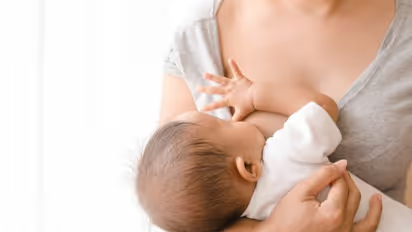World Breastfeeding Week: Importance, benefits of breastfeeding during COVID-19 pandemic; FAQs answered

Synopsis
On the occasion of the World Breastfeeding Week, let’s know what’s good and what’s bad for lactating mothers
Bengaluru: As the new cases of COVID-19 are increasing at an alarming rate in India, the pandemic is a stressful time for everyone, especially true for mothers who are breastfeeding and concerned about their baby's health. However, new mothers can successfully start and maintain breastfeeding during COVID-19 pandemic with some recommended precautions.
If you are a mother or expecting, it is only natural to have questions about what is safest for your baby in the current situation. Evidence is overwhelmingly in support of breastfeeding. The World Health Organization (WHO) recommends all women to breastfeed during the COVID-19 Pandemic.
Early initiation of breastfeeding and continuing exclusive breastfeeding up to six months helps your baby to thrive. To date, the transmission of active COVID-19 (the virus that can cause infection) through breast milk and breastfeeding has not been established.
Breastfeeding protects newborns from getting sick and also helps protect them throughout their infancy and childhood. Breastfeeding is especially effective against infectious diseases because it strengthens the immunity by directly transferring antibodies from the mother. If you are about to have a baby, you should be supported to breastfeed safely and share a room with your baby.
Here are some answers to common questions from new and expecting mothers during this pandemic.
Is it safe to breastfeed during the pandemic?
Absolutely. Breast milk provides antibodies that give babies a healthy boost and protect them against many infections. Antibodies and bioactive factors in breast milk may fight against COVID-19 infection, if a baby is exposed.
If your baby is six months old or younger, he/she should be breastfed exclusively. Once your infant is over six months, continue breastfeeding with safe and healthy complementary foods.
Can I infect my baby with COVID-19 by breastfeeding?
Although researchers are continuing to test breast milk in various countries since the beginning of the COVID-19 pandemic, to date the transmission of active COVID-19 through breast milk and breastfeeding has not been established.
Should I breastfeed if I have or suspect having COVID-19?
Yes, continue breastfeeding with appropriate precautions. These include wearing a mask, washing your hands with soap and water or with an alcohol-based hand rub before and after touching your baby, and routinely cleaning and disinfecting surfaces you have touched. Wash your breasts and keep them covered after breastfeeding. You don't need to wash your breasts before every feeding unless you coughed over it.
Other measures which help protect your baby include:
1. Coughing or sneezing into a tissue and disposing of it immediately.
2. Cleaning and disinfecting surfaces you have touched.
3. Wearing a mask where possible.
4. Keeping the baby at least six feet away from your bed or in the next room if possible.
5. Routine baby care by a healthy relative when not breastfeeding.
What should I do if I'm too unwell to breastfeed?
If you are feeling too sick to breastfeed your baby, try to find other ways to safely provide your baby with breast milk. Try expressing milk and feed your baby via a clean palladia or spoon. Expressing breast milk is also important to sustain milk production so you can breastfeed your baby again when you feel well enough to do so. There is no fixed time interval to wait after confirmed or suspected COVID-19.
Should I breastfeed if my baby is sick?
Continue to breastfeed your baby if he/she becomes ill. Whether your little one contracts COVID-19 or another illness, it is important to continue nourishing him/her with breast milk. Breastfeeding boosts your baby's immune system, and your antibodies are passed to her through breast milk, helping them to fight infections.
What precautions should I take while breastfeeding?
Make sure you follow handwashing guidelines. Your hands should be washed with soap and water before and after touching your baby. You may also use an alcohol-based hand rub. It is also important to clean and disinfect any surfaces that you have touched. Wash breast milk pumps, milk storage containers, and feeding utensils after every use as usual.
(Author - Dr Sreenath Manikanti is senior consultant neonatologist & HOD at Fortis La Femme Hospital, Richmond Road, Bengaluru)